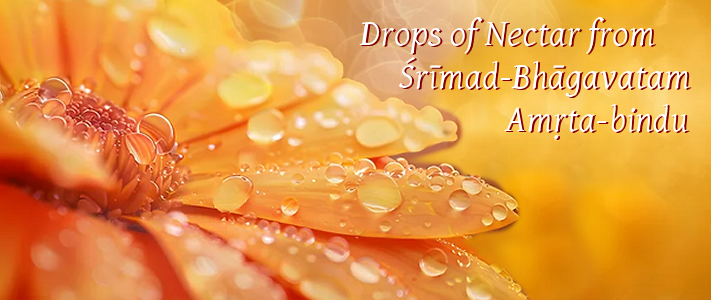
Nectar Drops from Śrīmad Bhāgavatam
Drops of Nectar from
Śrīmad-Bhāgavatam – Amṛta-bindu –
कृष्णे स्वधामोपगते धर्मज्ञानादिभि: सह ।
कलौ नष्टदृशामेष पुराणार्कोऽधुनोदित: ॥ ४३ ॥
kṛṣṇe sva-dhāmopagate, dharma-jñānādibhiḥ saha
kalau naṣṭa-dṛśām eṣa, purāṇārko’dhunoditaḥ || 43 ||
This Bhāgavata Purāṇa is as brilliant as the sun, and it has arisen just after the departure of Lord Kṛṣṇa to His own abode, accompanied by religion, knowledge, etc. Persons who have lost their vision due to the dense darkness of ignorance in the Age of Kali shall get light from this Purāṇa. (SB 1.3.43)
Drops of Nectar (Amṛta-bindu) is a collection of nectarine essays from Śrīmad-Bhāgavatam.
Śrīmad-Bhāgavatam is so carefully presented that a sincere and serious person can at once enjoy the ripened fruit of Vedic knowledge simply by drinking the nectarean juice through the mouth of Śukadeva Gosvāmī or his bona fide representative. By residing in the ocean of nectar one may always feel transcendental pleasure..."
The timeless wisdom of India is expressed in the Vedas, ancient Sanskrit texts that touch upon all fields of human knowledge. Originally preserved through oral tradition, the Vedas were first put into writing five thousand years ago by Śrīla Vyāsadeva, the "literary incarnation of God." After compiling the Bhāgavatam, Vyāsa imparted the synopsis of it to his son, the sage Śukadeva Gosvāmī. Śukadeva Gosvāmī subsequently recited the entire Bhāgavatam to Mahārāja Parīkṣit in an assembly of learned saints on the bank of the Ganges at Hastināpura (now Delhi).
In Kali-yuga, simply by hearing the Bhāgavatam one attains the highest perfection.
This fruit, the ripened fruit of Vedic knowledge, Śrīmad-Bhāgavatam, is already very tasteful because it is the ripened fruit, but it has been tasted by the lips of Śukadeva Gosvāmī; therefore it is still more tasteful. Therefore it is recommended, "Now, this ripened fruit, just taste it, drink it." (Lecture on SB 1.1.3)
Another explanation of this verse is that any fruit ripened in the tree, it is already very nice, very sweet. If you take an unripe fruit from the tree and keep at your home, it also ripens, but it is not so tasteful. If it is ripened in the tree and you take it, then it is very tasteful. I think you have got this experience. Again if that fruit is cut by the lips or by the beaks of the parrot, which is called śuka, it becomes still more tasteful. Similarly, this fruit, the ripened fruit of Vedic knowledge, Śrīmad-Bhāgavatam, is already very tasteful because it is the ripened fruit, but it has been tasted by the lips of Śukadeva Gosvāmī; therefore it is still more tasteful. Drava-saṁyutam. Therefore it is recommended, pibata bhāgavatam, "Now, this ripened fruit, just taste it," pibata, "drink it." Pibata bhāgavataṁ rasam.
The Śrīmad Bhāgavatam is very dear to all the pure devotees of the Lord because it is the book where the Lord is directly described in all detail. Most of the Vedas describe the Lord only indirectly, hiding the treasure of devotional service deep into cryptic words, but in the Śrīmad Bhāgavatam, everything is clear. Even Māyāvādīs avoid touching it, understanding that it is not possible to sustain their philosophy when confronted with the clear descriptions present there.
The Śrīmad Bhāgavatam is the amala Purāṇa, the spotless Purāṇa. Some think that all Vedic literature is at the same level, but there is a gradation. Most of the Vedic scriptures speak about Karma-Kāṇḍa: rituals, and fruitive activities. In the highest sense, all verses of the Vedas speak about devotional service, but unless one knows what exactly to look for, he will not be able to find it. Other sections of the Vedas deal with jñāna, the Upāsanā - Kāṇḍa. Higher still are the portions that deal with devotional service. Amongst such selected passages, the Śrīmad Bhāgavatam shines as the most exalted. Everything that is not pure is kicked out of Śrīmad-Bhāgavatam:
“Completely rejecting all religious activities which are materially motivated, this Bhāgavata Purāṇa propounds the highest truth, which is understandable by those devotees who are fully pure in heart.” (SB 1.1.2)
The Śrīmad-Bhāgavatam gives us the view of the world of the paramahaṁsas: How can we get free from the darkness of the age of Kali and situate ourselves on the platform of pure devotional service to The Lord, free of contamination of mental speculation or fruitive hankering.
Even after compiling all the Vedas, Śrīla Vyāsadeva was still dissatisfied. His spiritual master, Śrī Nārada, advised him to narrate the sublime and spotless glories of the Personality of Godhead. Understanding his intention, Śrīla Vyāsadeva composed the Śrīmad-Bhāgavatam, speaking exclusively about pure devotional service. The Śrīmad-Bhāgavatam is a scripture for pure devotees and anyone who studies it, even if not a pure devotee himself, will in due course of time become a Mahā-Bhāgavata, as spotless as the Śrīmad Bhāgavatam itself.
“By regular attendance in classes on the Bhāgavatam and by rendering of service to the pure devotee, all that is troublesome to the heart is almost completely destroyed, and loving service unto the Personality of Godhead, who is praised with transcendental songs, is established as an irrevocable fact.” (SB 1.2.18)
Śrīla Vyāsadeva first spoke it to Śukadeva Goswami, who by hearing the beautiful Śrīmad Bhāgavatam was moved from his meditation on the impersonal Brahman and became attracted to devotional service to the Lord.
Śukadeva Goswami in turn recited Śrīmad-Bhāgavatam to Mahārāja Parīkṣit on the banks of the Ganges. Śrīla Sūta Goswami was present in the meeting, and later he recited Śrīmad Bhāgavatam to the sages in the Naimiṣāraṇya forest. Just like a fruit becomes even sweeter when touched by the beak of a parrot, the Śrīmad-Bhāgavatam became even sweeter after it was recited by these two sages.
O expert and thoughtful men, relish Śrīmad-Bhāgavatam, the mature fruit of the desire tree of Vedic literatures. It emanated from the lips of Śrī Śukadeva Gosvāmī. Therefore this fruit has become even more tasteful, although its nectarean juice was already relishable for all, including liberated souls. (SB 1.1.3)
In this śloka, it is definitely stated that spiritual rasa, which is relished even in the liberated stage, can be experienced in the literature of the Śrīmad-Bhāgavatam due to its being the ripened fruit of all Vedic knowledge. By submissively hearing this transcendental literature, one can attain the full pleasure of his heart's desire. (SB 1.1.3, Purport)
The Śrīmad-Bhāgavatam is the essence of all Vedic literatures, and it is considered the ripened fruit of the wish-fulfilling tree of Vedic knowledge. It has been sweetened by emanating from the mouth of Śukadeva Gosvāmī. You who are thoughtful and who relish mellows should always try to taste this ripened fruit. O thoughtful devotees, as long as you are not absorbed in transcendental bliss, you should continue tasting this Śrīmad-Bhāgavatam, and when you are fully absorbed in bliss, you should go on tasting its mellows forever.
***
Download PDF
Drops-of-Nectar.pdf


